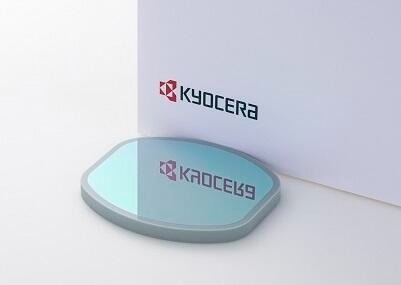Kyocera Corporation (President: Hideo Tanimoto, hereinafter: Kyocera) announced that its "Fine Cordierite" ceramic mirror has been chosen for use in experimental equipment to conduct optical communication between the International Space Station (ISS) and a mobile optical station on Earth. This is the first time that cordierite has been adopted for such a purpose.
 Kyocera's Fine Cordierite Ceramic Mirror. Image Credit: Kyocera Corporation
Kyocera's Fine Cordierite Ceramic Mirror. Image Credit: Kyocera Corporation
Kyocera's Fine Cordierite ceramic mirror has been adopted in the optical communication antenna (Quantum-Small Optical Link, Hereinafter: QSOL) developed by Sony Computer Science Laboratories, Inc. (President and CEO: Hiroaki Kitano, Hereinafter: Sony CSL). Developed following a commission from Japan's Ministry of Internal Affairs and Communications, QSOL is an optical communication antenna component for the Secure Laser Communications Terminal for Low Earth Orbit, "SeCRETS", for on-orbit technology demonstration.
This demonstration was conducted jointly by the National Institute of Information and Communications Technology (President: Hideyuki Tokuda, hereinafter: NICT), the School of Engineering, the University of Tokyo (Dean: Yasuhiro Kato), the Next Generation Space System Technology Research Association (President: Koji Yamaguchi), SKY Perfect JSAT Corporation (Representative Director, President and Chief Executive Officer: Eiichi Yonekura), and Sony CSL.
Background of Material Selection
The current method for two-way data communication between Earth observation satellites in space and ground stations involves using optical wireless communication with either radio waves or visible light. This communication is essential for acquiring image data for weather forecasting, disaster response, and infrastructure monitoring.
Advancements in the sensors installed on Earth observation satellites have resulted in an increased volume of obtainable observation data. However, there is a pressing need to rapidly transmit large amounts of observation data to ground stations. Achieving high-speed and high-capacity data communication has posed a challenge for space infrastructure. To address this issue, the implementation of laser-light optical communication is expected to enable data transmission and reception at speeds over 100 times faster than radio wave communication with significantly higher capacity.
Additionally, to transmit data from satellites to specific ground stations by optical communication, it is necessary to adjust the light to the optimal angle using optical mirrors. Conventionally, metal or glass mirrors have been used, but nanoscale precision is required for adjusting light. Therefore, mirrors with long-term stable dimensional accuracy and the ability to withstand thermal expansion and temperature changes in the harsh space environment are needed.
In this experiment, Kyocera's Fine Cordierite ceramic mirror was installed in QSOL due to its unique thermal and mechanical properties, such as low thermal expansion and long-term dimensional stability.
With the success of this experiment, we believe that our products can contribute to the construction of space infrastructure aimed at achieving high-speed and high-capacity data communication in satellite optical communication in the future.
Kyocera will continue to leverage its Fine Ceramic technology to develop reliable components that contribute to research and observation in the fields of astronomy and space.
Features of Kyocera's Fine Cordierite Ceramic Mirror
Kyocera's Fine Cordierite ceramic mirror possesses the following four properties, achieved through our Fine Ceramic material and firing technology developed over more than 65-years to enable stable optical communication even in space.
(1) Low Thermal Expansion
The expansion and dimensional changes due to temperature variations are extremely small, making it possible to apply them to optical mirrors that require nanoscale precision.
(2) High Mechanical Strength and High Rigidity
Compared to low thermal expansion glass, Kyocera's Fine Cordierite ceramic mirror has 1.5 to 2 times higher mechanical strength, offering greater rigidity compared to glass and enabling weight reduction.
(3) Long-Term Dimensional Stability
Fine Cordierite exhibits excellent dimensional stability compared to low thermal expansion glass, allowing for use over extended periods without concern for dimensional changes.
(4) Radiation Resistance
Testing for radiation exposure confirmed that Fine Cordierite's coefficient of thermal expansion (CTE) remains unchanged, making it ideal for space applications.
Kyocera will exhibit its Fine Cordierite ceramic mirror at SPIE Astronomical Telescopes and Instrumentation 2024, to be held at Pacifico Yokohama (Yokohama City, Japan) from June 18- June 20. (Booth No. 314)
About the Experiment
SeCRETS was launched towards the ISS on August 2, 2023, and installed on the external experiment platform of the "Kibo" Japanese Experiment Module (Intermediate Space Environment Experiment Platform [i-SEEP]). Subsequently, secret key sharing was carried out using 10GHz clock optical communication from the ISS in low orbit to a portable optical ground station on the ground, and further successfully demonstrated secure communication between the ISS and the ground station using one-time pad encryption with the key.